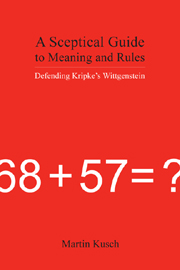Book contents
8 - Kripke's interpretation of Wittgenstein
Summary
Introduction
In previous chapters I have sought to interpret and defend the meaning-sceptical position that Kripke attributes to Wittgenstein. In doing so, I have, for the most part, left aside the question of whether Kripke's reading of Wittgenstein is correct. In this chapter, I shall finally address this issue. I shall argue that Kripke's interpretation of the sections on rule-following in PI and the Remarks on the Foundations of Mathematics is, by and large, on target. I shall make my case by taking on the most important of the opposite views: Baker and Hacker's 1984 book, Scepticism, Rules and Language (SRL). The detail and influence of Baker and Hacker's study should not come as a surprise: after all, who would be more qualified to assess the correctness of an interpretation of PI than the authors of a four-volume analytic commentary on that very work! Given the central position of Baker and Hacker's critique in the debate over WRPL, it seems defensible to confine the discussion of the interpretational issue mainly to a critical assessment of their objections.
Baker and Hacker's negative assessment of WRPL as an interpretation of Wittgenstein has become widely accepted. For instance, the leading Wittgenstein scholars Cora Diamond and Meredith Williams write that “the Baker–Hacker case against Kripke is entirely convincing”, and that Baker and Hacker have rightly “won the day”. Only rarely has “the Baker–Hacker case” been challenged. Jane Heal finds SRL “unpleasant and unrewarding”, and Edward Craig agrees: “Right or wrong, Kripke's book put the debate about rules on a high level of content and clarity.
- Type
- Chapter
- Information
- A Sceptical Guide to Meaning and RulesDefending Kripke's Wittgenstein, pp. 237 - 264Publisher: Acumen PublishingPrint publication year: 2006



